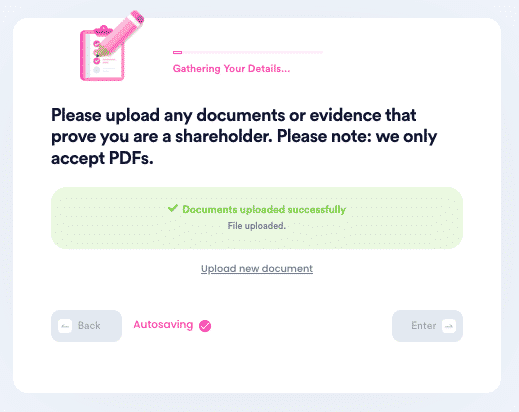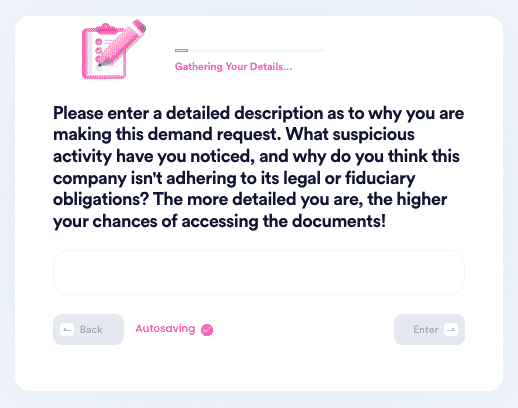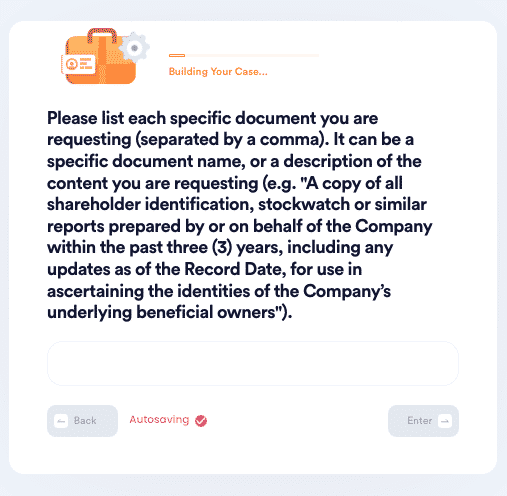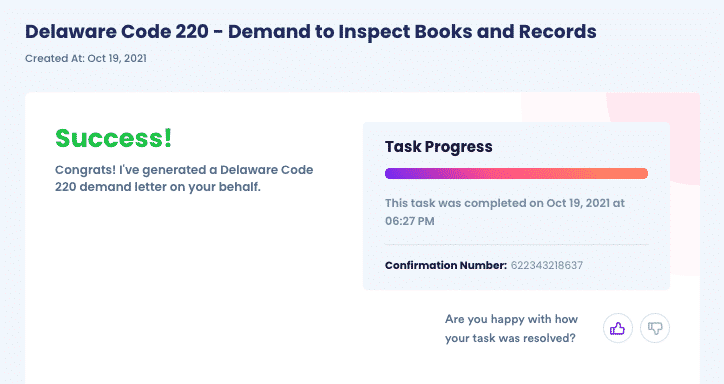File a Delaware Section 220 Books and Records Demand
There has been a definite upswing in stockholders and directors filing a Delaware's DGCL Section 220 gives stockholders and directors the right to seek information from a Delaware corporation. These rights apply to situations where plaintiffs have what the Court of Chancery has described as "proper cause" to gain the information.
There is a clear procedure to gain access to books and records content, and the courts have established standards an applicant, or their agent, must follow. It begins with knowing what sort of information requests stockholders can make.
We will go into this in more detail, but it is a complex issue, so you may find it invaluable to read some background. It is important to learn which rights stockholders and directors have as well as know the rights and advantages they may obtain under DGCL 220.
Section 220 Books and Records Demand Errors, and How to Avoid Them
Making errors in an initial 220 books and records demand application enables a corporation to deny the request. If you, as a stockholder, then take the matter to court, the initial error gives the corporation an advantage, making it easier for the judge to formally deny your request.
The safest way to avoid both simple form-completion errors and, of course, errors is to use an experienced and trusted professional. In addition to using such a professional, it makes sense to know the basics of a 220 books and records demand request. You will also find this sample demand letter will help you to know how to prepare one properly should you decide to do it all yourself. A major advantage in submitting a successful demand is to know the basics and also to make use of an experienced professional.
Successful books and records demands are founded on:
- Having good background knowledge.
- Knowing and following accepted Court of Chancery procedures.
- Having a basic understanding of how the most recent Delaware Supreme Court decisions may impact your request application
Section 220 Books and Records Demand: The Rules to Follow When You Do It Yourself
Step 1 is to send a formal demand letter to the corporation. The demand has to comply with Section 220 provisions and must:
- Be made under oath.
- Include the applicant's status as a stockholder or director.
- Provide documentary evidence of stockholding.
- State that the included information is a true and correct copy of original documentation.
- Be sent to the corporation's registered Delaware office or to its primary place of business if that is outside Delaware.
- Include written authorization (such as a POA) if the demand is being made by the applicant's agent or attorney.
Proper Purpose
220 DGCL requires that the demand meets the proper purpose standard. General, casual, or frivolous requests are not supported by statute. Proper purpose reasons for demand include, but are not limited to:
- Valuing the stockholder's financial interest in the corporation.
- Investigating the possibility of mismanagement.
- Investigating possible maladministration.
- Investigating potential wrongdoing by management or a corporate fiduciary.
- Learning more about private communications to do with possible mergers with or take-overs of, or by, another entity.
If mismanagement or inappropriate actions are suspected, the demand must include a credible basis from which a court can infer such actions have taken place, should the corporation refuse to release that information.
The Scope of the Request
A Section 220 demand permits inspection of:
- The stock ledger.
- The list of stockholders.
- "Other books and records.”
The Court of Chancery only permits these other books and records to be inspected if they are necessary to discover the answers to the "proper purpose" request. The only documents which may be released are those which are proven to be what the court calls "essential and efficient to accomplish the request's stated purpose."
The Permitted Time Period for Responding to a Section 220 Request
The corporation must comply with the initial demand letter within five (5) business days. After that, the applicant may file an action with the Court of Chancery to hear the case.
The Delaware Court of Chancery and the Demand Hearing
If the corporation refuses to release the requested documents, the next step is to seek redress. This means applying to the Delaware Court of Chancery. The basics of a court hearing are as follows:
| Does the business’ location matter? | Regardless of in which state the corporation's primary place of business is located, the only court permitted, under DGCL Section 220, to hear a demand case is the Delaware Court of Chancery. |
| How long will it take for the court to hear the case? | The court usually hears the case within 90 days, but litigants may make an expedited application. |
| How are arguments made? | arguments are typically made via written submissions, which will be the basis of any oral submissions. Live testimony, as opposed to oral argument, is given if material facts are in dispute. |
| How long will it take before the court decides? | If the case is based entirely on written submissions, the court typically delivers its decision on the same day. Where oral argument or live testimony is given, the court may ask for post-trial submissions before making its decision. |
Because cases can be complex, and the corporation's team will be handling their side, it becomes more important for the applicant making the request to be legally represented as well.
Who Pays the Court Fees in a Section 220 Request Hearing?
Each party typically pays its own fees. If the court decides that one party behaved in bad faith during the litigation or if there is an underlying agreement about fees, then the court may shift the fee from one party to the other.
Appealing a Books and Records Decision
Either party may appeal the Chancery Court's decision to Delaware Supreme Court. The appeal must be lodged within 30 days. The appeal process may take up to 12 months.
The Next Steps to Submit a Section 200 Books and Records Demand if You Cannot Do It Yourself
Armed with the basics and the background knowledge provided, you will be able to make your demand. Pay attention to the details of the submission letter. Otherwise, the corporation will have a perfect reason not to comply. If they refuse, and you take the matter to court, it is essential to know, understand, and follow court procedure. Again, it will be of enormous help to learn how to file a Delaware Section 220 request.
If you decide it is in your best interests to work with a professional, then DoNotPay is here for you.
Solve the Section 220 Books and Records Demand With the Help of DoNotPay
The best-laid plans can fail because of small detail. When those details are stipulated by Delaware law, the potential to fail may increase. Time, effort, and strict attention to detail are essential parts of a successful Section 220 books and records request.
By using DoNotPay to submit your request, you only have to provide basic information, which we use to create the initial letter. If we need more detail, we will ask you. You can rest assured that our skills will be focused on your success. Here is all you need to do:
- Search Delaware Code or Stock Inspection on DoNotPay.

- Confirm that the company you are hoping to inspect is a Delaware Corporation and that you are a stockholder.

- Tell us why you are requesting the information and what you plan on doing with it.

- Specify the names or types of documents you are requesting.

- That's it! DoNotPay will generate the formal request letter on your behalf and send it to the company.

We will respond quickly and have your initial demand ready for it to be submitted as soon as possible. We will monitor the corporation's response and, with your permission, take it to the next level of seeking a decision in your favor. Get the ball rolling on , and we will take it from here.
DoNotPay Works Across All Aspects of Delaware Law
If you do not need to submit a 220 records request but have other issues to do with a company, entity, or individual, we can work to resolve those issues as well. You will find this information invaluable if you need to make a complaint against a company, whether it is an LLC, an LLP, or a corporation.
Or, as part of your general research, it may help you to learn more about the Freedom of Information Act.
Always remember that DoNotPay is here for you and will help you with solving all kinds of issues, be they , technical, or financial, just to name three areas. We look forward to helping you.


